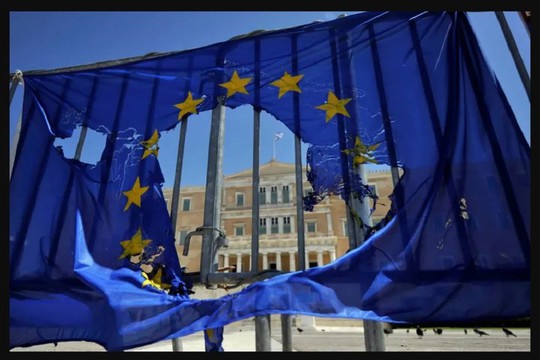The European project is approaching a tipping point. A combination of political paralysis, external threats and economic malaise is threatening to end the European Union’s ambitions to become a global force in its own right — pushing member states toward defending their own interests instead, states Bloomberg.
After decades of warnings and sub-par growth, the region’s leaders are suddenly confronting a barrage of evidence that decline is becoming unstoppable.
France’s europhile president has surrendered veto power over his government to the far right; Germany’s biggest carmaker is talking about shuttering factories at home for the first time ever; US tech giants are turning their backs on the European market because of its new restrictions on artificial intelligence.
Those developments all underpin the EU’s failure to act as a cohesive and dynamic economic bloc, eroding its status and degrading its capacity to respond to a wide range of threats from Chinese industrial policy to Russian aggression, or even a future antagonistic administration in the US.
Recent apathy or pushback by governments after former Italian premier Mario Draghi’s wake-up call for more investment and common bonds to combat feeble productivity growth underscore how the region has all but given up trying.
“If you wanted to be a geopolitical power, then economic might is the key ingredient,” says Guntram Wolff, a professor at the Free University in Brussels and senior fellow at the Bruegel think tank. “Productivity growth has just been a disaster. Europe is still rich, but these differentials over 20 years have massive implications.”
The fundamental problem is that the world is experiencing the dramatic shifts of climate breakdown, demographic change and the move to a post-industrial economy — all phenomena where Europe’s ability and willingness to respond are lagging.
The region’s geopolitical rivals are seeking to exploit those transformations, whereas too many of the EU’s biggest members are saddled with economic models that have failed to deliver for too long — and restless voters who won’t embrace alternatives.
“Something is changing very, very dramatically and very, very deeply in this world,” former Polish President Aleksander Kwasniewski said in an interview. “We can’t react correctly, because we are too slow.”
To be sure, living standards in Europeans wealthy economies aren’t on the verge of collapse. Some countries might well benefit from investment or trade deals with the US, China or Russia. But the longer the current trends persist, the greater Europe’s vulnerability to dramatic shocks will become.
“I really believe we are at risk,” French President Emmanuel Macron said earlier this month on a panel in Berlin. “In the two to three years to come, if we follow our classic agenda, we will be out of the market. I have no doubt.”
Macron argues that the loss of cheap Russian fossil fuels and the advent of US President Joe Biden’s aggressive subsidy-intense industrial policy, mark a rupture with the old model that allowed Europe’s export-based economies to flourish.
That adds to pre-existing challenges posed by the rise of China and its own vast manufacturing machine, and the global leap forward in technology innovation that has largely bypassed the region.
“Europe is in danger,” says David Galbraith, a tech entrepreneur and investor who has spent his career working on both sides of the Atlantic and perceives the world economy to be in the midst of a transformation akin to the industrial revolution.
“Look at what happened to countries that failed to industrialize,” he said. “They didn’t do very well.”
The result threatens to cause damage that goes beyond simply lagging in investment and productivity: the region’s leaders are losing faith in the European project.
Officials in core European countries are starting to view the EU as an obstacle they need to get around — rather than the source of prosperity and protection it has represented until now.
The EU’s relative decline has been unceasing over the quarter century since monetary union. An analysis by Bloomberg Economics shows that the bloc’s economy would be about €3 trillion ($3.3 trillion) bigger if it had kept pace with the US — enough to boost the income of the average worker by about €13,000 a year.
“The foundations on which we built are now being shaken,” Draghi said in the introduction to his report. “This is an existential challenge.”
“It’s obvious that Europe is falling behind it’s main trading partners, the US and China,” Greek Finance Minister Kostis Hatzidakis said in a Sept. 24 interview. “If it doesn’t take immediate action, the decline will eventually become non reversible.”

read more in our Telegram-channel https://t.me/The_International_Affairs

 12:34 30.10.2024 •
12:34 30.10.2024 •























